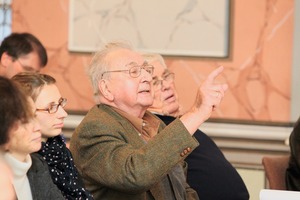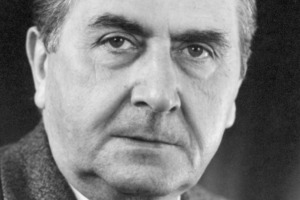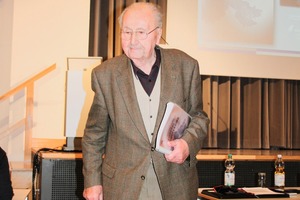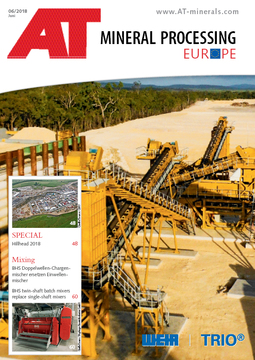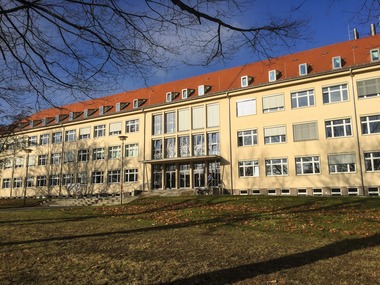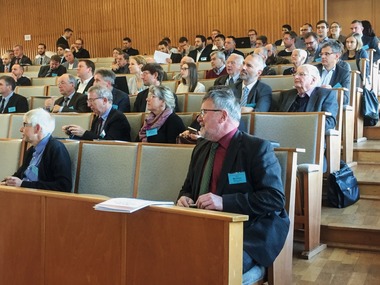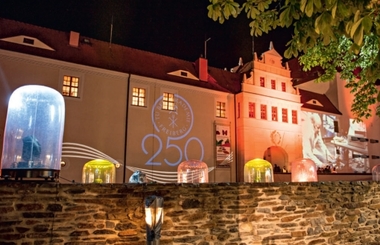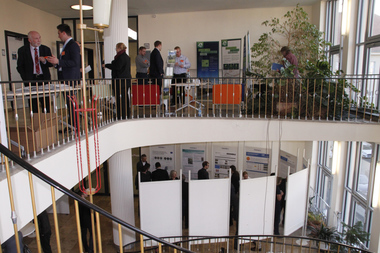In memory of Prof. Heinrich Schubert (1926 – 2018)
On Monday, 9 April 2018, Prof. Dr. sc. techn. Drs. h.c. Heinrich Schubert, one of the most internationally renowned scientists in the field of mineral processing and process engineering, died. His extraordinarily long and successful work is shown in over 300 frequently cited publications as well as 25 patents. He guided and supervised about 550 graduates and 60 PhD students at Bergakademie Freiberg, eight of whom becoming professors themselves. His specialist books have become standard works in his field thanks to his steady and meticulous work.
Prof. Heinrich Schubert is particularly respected in his field because he introduced the consequent hierarchical organization of process engineering in physical-chemical fundamentals, microprocesses, macroprocesses and procedures to obtain a fundamental scientific understanding of mineral processing and therefore evolve it from mining lore to a modern science.
Prof. Schubert was born on 23 January 1926 in Pirna-Jessen near Dresden. He studied from 1947 to 1951 at Bergakademie Freiberg and concluded his studies in 1951 as a graduate engineer in mineral processing and in 1952 as a graduate engineer in mining. In 1956 he earned his PhD with his thesis on “Floatability and structural relations in cation-active flotation”. In 1971 he achieved the academic degree of Dr. sc. techn with his work on the “Role of association of the non-polar groups in collector adsorption”. From 1952 to 1959, he worked at Mansfeld copper slate mining, amongst other things as Technical Director in the VVB NE-Metallindustrie Eisleben, before being appointed as a university lecturer at Bergakademie Freiberg in 1960 and then as Director of the then Institute of Mineral Processing.
Heinrich Schubert succeeded Prof. Helmut Kirchberg and developed the Institute until his retirement in emeritus status in 1991 to a modern and well equiped place of teaching and research. The institute’s spectrum of teaching and research was widened with his work in the direction of mechanical process engineering and, besides the processing of, for example, sylvine and other salt minerals, fluorite and cassiterite, with the focuses:
Modelling and optimization of processes with multiphase flows, especially hydrodynamics of flotation processes and classification in hydrocyclones
Modification of particle surfaces with selective adsorption of amphiphilic molecules, especially the impact of molecule structure on and the energy balance of adsorption
Microprocesses in comminution, especially of the physically based modelling of the selection and the breakage function for optimization of single particle and particle bed stressing
Flow behaviour of bulk solids tending to caking, especially salts
Mechanical processing of secondary raw materials (recycling), especially the fracture behaviour of non-brittle materials and industrial-scale processing of scrap electronics
In the education of engineers, the understanding of fundamental mathematic-scientific principles was consolidated accordingly, and the material-specific content pared back in favour of process orientation. Prof. Schubert always kept an eye on global developments and in the conceptualization of his research and teaching courses, he incorporated knowledge from the Anglo-American region (including C. Orr) just as much as from the work of Hans Rumpf at the University of Karlsruhe, whom he greatly revered. He generally regarded the lively participation at national and international meetings and colloquia as a central aspect of scientific life. His always passionately presented, well-founded contributions to discussions, which he liked to present with a raised forefinger, were legendary. A personal highlight can therefore be seen in the decision of the International Scientific Committee of the International Mineral Processing Congress (IMPC), to award the organization and hosting of the 17th International Congress to Bergakademie Freiberg in 1991 and to hold the congress in Dresden.
Heinrich Schubert’s services to the development of the University overall should not be forgotten. Worth special mention are his terms in office as pro-rector for the development of science and research (1963 – 1975) and as head of the Faculty of Technical Sciences (1980 – 1991). In these years, he had the privilege of being a guest professor in non-communist countries when in 1981 he taught at the University of Queensland/Australia, then at the University of Iowa/USA, in 1982 and at the University of Iron and Steel Wuhan/China, in 1982. His lectures covered mechanical process engineering, mineral processing and particle technology. He received several honorary doctorates, including in Miskolc and Leuna-Merseburg. His special honours include the National Award of the GDR (1980), the Hans Rumpf Medal of the German Association of Chemical and Process Engineering (1997) and Lifetime Achievement Award International Mineral Processing Congress (2006).
His well-known books on the “Processing Solid Minerals“ (in German) in three volumes, the course book “Mechanical Process Engineering” and the two-volume “Handbook of Mechanical Process Engineering” will always have their place in libraries to be used by future engineers and scientists. The books cover a wide range from the theoretical fundamentals of process engineering to its industrial applications. They are testament to the wealth of ideas and creativity of an honoured scientist and university lecturer.
His friends and colleagues, the scientists and students working under his direction came to know Prof. Schubert as a distinguished personality with great power of persuasion. They all knew and valued Prof. Schubert as an outstanding individual with very high standards for his own work and that of others. His unwavering demand for perfection and accuracy moulded generations, equipping them with what they need for their further journey through life. Together they mourn no longer having him around for his critical comments and helpful advice. At the same time, they are all very grateful to him for his work and achievements.
All national and international colleagues are invited to use
the condolence blog (Link:https://blogs.hrz.tu-freiberg.de/kondolenz-schubert/) to express their gratitude and reminisce about memorable moments.
Dr. Thomas Mütze, Institute für Mechanische Verfahrenstechnik
und Aufbereitungstechnik, TU Bergakademie Freiberg

